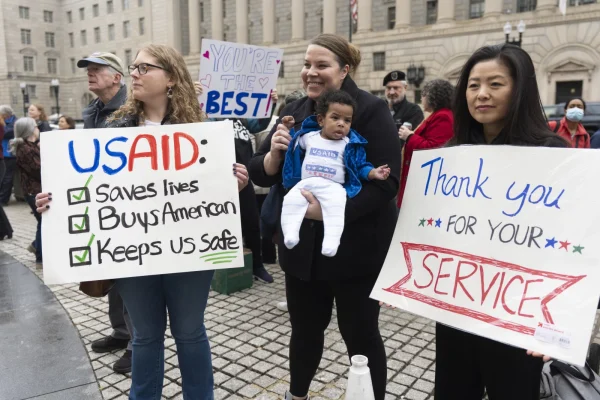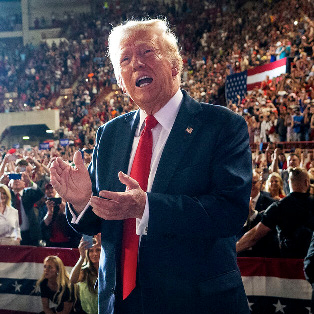
From feeding starving children in Congo, to providing maternal healthcare in Bangladesh, to countless other powerful and crucial programs, the United States Agency for International Development (USAID) was responsible for providing life-saving aid around the world. That is, until Donald Trump decided to cut 90% of all foreign aid contracts, including $60 billion in USAID funding. This represents a moral and humanitarian disaster, as millions who rely on USAID for food, healthcare and even basic security now may be left stranded with no one to help. Not only that, it is a foreign policy nightmare for the United States.
Harvard theorist Joseph Nye is credited with introducing a term that is all the more relevant today, largely due to the issues at hand with Trump’s foreign aid cuts: soft power. Soft power is the idea that states can utilize methods other than force to co-opt, rather than coerce, other countries into acting in a way that is favorable to it. This can include aid, cooperation and cultural influence. For a long time, the U.S. has dominated soft power. When people around the world saw the American flag, it often represented freedom, pop culture and, notably, support. Rather than seeing the American flag emblazoned on warplanes and missiles, as millions around the globe have witnessed recently, a vast majority of the world used to associate the symbol with Hollywood and McDonalds, and in many cases, food, education and healthcare. This turned the global perception largely in favor of the United States.
It is crucial to note, though, that soft power is not the end all be all. Hard power, or military and economic coercion, has been a staple of global diplomacy for as long as it has been a field. It is, however, not a successful effort on its own. Donald Trump’s strategy, as he has made evident through threats to pull out of NATO and the UN, his actual withdrawal from the Paris Climate Agreement, and his bullying of Volodymyr Zelenskyy, a leader of a key American ally, shows that he is not interested in soft power or cooperative diplomacy. His aggressive rhetoric towards American allies and threats (and impositions) of tariffs, show the same thing. Trump’s position of a strongman who wants to exercise solely hard power can prove effective, yes, but it ignores one key detail.
Military force and economic coercion alone are not enough, and can actually have an adverse effect. Countries that feel threatened or pressured by the United States can find alternative forms of support, such as the BRICS initiative with Russia and China, seen largely as a direct attack on United States dominance around the world. China has been mastering the soft power game through its Belt and Road Initiative, where it sends considerable amounts of foreign aid to developing countries, turning global perceptions of China, especially in countries where U.S. soft power is lacking, such as Southeast Asia, incredibly positive. If there were no other options, countries would accept subjugation by the U.S., but that is not the reality. Countries can cozy up to China, Russia or countless other powerful countries eager to expand their soft power.
Trump’s foreign policy is predicated on exerting influence through tariffs, threats and even military coercion, but its impacts have unfolded right before Americans’ eyes. Placing tariffs on key American allies, such as Canada and Mexico, as well as making threats to Panama, have stirred strong reactions, from flag-burning to boycotts and protests against the U.S., typically a feature of states that are declared enemies of the U.S., not allies. Pulling out of agreements and alliances further alienates America from our allies, and forces them to build allegiances to alternative countries, oftentimes those whose interests are opposed to America’s. All of this sounds bad on paper, but it is even worse on the ground. If other countries begin shifting away from America, as they have, economic isolation and political consequences can befall America, as many countries feeling abandoned by America, or even attacked by their former ally, will seek alternatives, and can even abandon America altogether.
USAID, and humanitarian foreign aid in general, accounts for less than 1% of the United States’ budget yearly, meaning it does not take away from American citizens as much as Trump’s rhetoric implies, if at all, as it helps keep public opinion around the world in favor of the U.S., and bolster American soft power globally. Consumers in America will also suffer from Trump’s tariffs. 43% of all American imports in 2023 were from China, Mexico or Canada, all countries impacted by Trump’s tariffs. This means that all of these imports will decrease and/or become more expensive, and will, according to many economists, including Nobel prize winner Joseph Stiglitz, cause inflation both at home and abroad. Amit Khandelwal, professor at Yale University, also mentions how in 2018 and 2019, consumers bore close to all of the costs associated with those tariffs, shooting up prices for American consumers, and these tariffs were lower than the current level.
Donald Trump has made it clear what type of diplomacy he attempts to pursue: one based on aggression, both economic and rhetorical, and one where soft power, especially through foreign aid, does not hold major importance. What will likely follow is a mass exodus of American allies, such as Saudi Arabia, or the United Arab Emirates, towards China and Russia, and an eventual isolation of the U.S., both political and economic. Americans will bear the brunt of this, both through added costs and a global dislike of the United States, and it is crucial to understand: no matter what rhetoric Trump may employ in favor of isolationist policy, it is as implied in the name, isolating. This isolation is not good, and we, the people, will suffer as a result of it.























